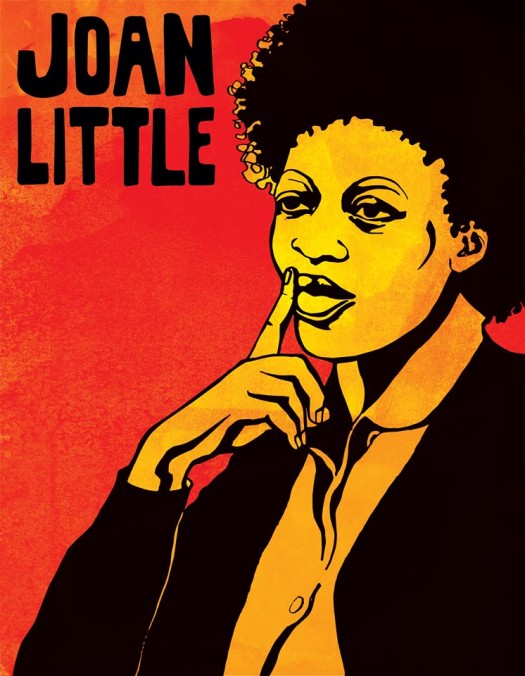No Selves to Defend #4: The Case of Joan Little
For the rest of this week, I will feature some of the stories in the new anthology ‘No Selves to Defend.’ I hope that you will buy a copy of the publication as all proceeds will support Marissa Alexander’s legal defense.
We kick off with Joan Little’s case. This short essay was written by Dr. Emily Thuma and the art is by the supremely gifted Micah Bazant.
On August 27, 1974 in Beaufort County, North Carolina, a twenty-year-old Black woman prisoner named Joan Little defended herself from sexual violence at the hands of a white male guard. Little gained control of an ice pick the guard had used to threatened her while she was in her cell, and she used the tool as a weapon to wound him. She then fled the jail. The guard did not survive his stab wounds and Little quickly became the target of a statewide search. One week later, Little surrendered and declared to state authorities and the press that she had acted in self-defense. An all-white grand jury charged her with first-degree murder, which carried the possibility of the death penalty, and she was sent to the women’s prison in Raleigh to await trial.
In the following year, a broad base of individuals and organizations from around the country participated in the mass mobilization that became known as the “Free Joan Little Movement.” From Oakland to Detroit to Atlanta, people formed local committees that helped the North Carolina-based Joan Little Defense Fund raise money to pay for Little’s bond (set at $115,000) and legal fees. Many widely known racial and economic justice and feminist organizations threw their support behind Little as well, including the Southern Poverty Law Center, Black Panther Party, Southern Christian Leadership Conference, Women’s International League of Peace and Freedom, and the National Organization for Women. The renowned a cappella group Sweet Honey and the Rock released a song entitled, “Joanne Little: She’s My Sister.” While out on bail before her trial, Little traveled the country and spoke to numerous audiences about her case as well as unjust prison conditions more generally.
With the help of the Center for Constitutional Rights and others, the legal defense team produced documentation that persuaded the court that Little could not receive a fair trial in Beaufort County and it won a venue change to Raleigh. The five-week trial began in July. During the trial, the defense called several Black women to the stand to testify about their own experiences of sexual harassment by white male staff at the Beaufort County jail, demonstrating a chronic pattern of abuse. The jury, made up of both Black and white jurors, deliberated for only seventy-eight minutes before acquitting Little.
While State v. Joan Little is noted for being the first time a woman was acquitted of murder on the grounds of self-defense against sexual violence, its wider impact and legacy was its powerful reflection of the interconnections of racism, sexism, and economic inequality. As scholar, activist, and former political prisoner Angela Y. Davis wrote in Ms. magazine in June 1975, “Those of us—women and men—who are Black or people of color must understand the connection between racism and sexism that is so strikingly manifested in her case. Those of us who are White and women must grasp the issue of male supremacy in relationship to the racism and class bias which complicate and exacerbate it.”

